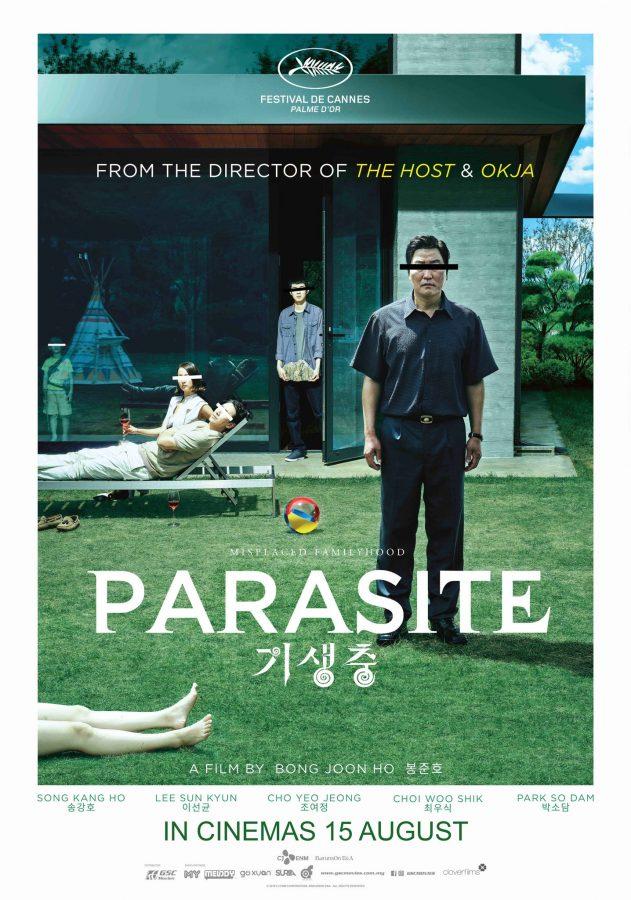Bong Joon-ho’s “Parasite” is not for the polite, the critic with folded hands or the reserved, well-postured movie-goer who blinks regularly. This year’s Palme d’Or winner is a masterwork of class and deceit that intertwines the best elements from thriller, dark comedy, tragedy, mystery and slasher films to create a unique whirlwind that defies all expectations of what cinema could be and creates a new standard for what it should be.
The story follows the destitute Kim family of four living on the fringes of society, leading an underground existence, out of sight from mainstream ambition. For siblings Ki-woo (Choi Woo-shik) and Ki-jung (Park So-dam), the traditional path of college, career and independence is a distant dream; instead, brother and sister help their unemployed parents, Ki-taek (Song Kang-ho) and Chung-sook (Jang Hye-jin), get by on odd jobs — at the start of the film, this means folding pizza boxes at rapid speed.
One of Ki-woo’s friends, Min-hyuk (Park Seo-joon) — a well-dressed university student who seems to be on the way to personal and financial success – recommends him to be an English tutor to Da-hye (Jung Ji-so), daughter of the Park family of four at the apex of society, their house a spacious open-concept monument to wealth and modernity. Through forged pasts and invented identity, each of the Kims filters into the lives and home of the Park family. What happens next is something you need to witness for yourself, but I will say this: you may need to blink a few times and take a walk around the block before adjusting to the normalcy of life outside the theater.
Bong’s “Parasite” is exciting because it is a series of unexpected events filled with reflections of the past. Each detail, prop and character is perfectly placed; unbeknownst to viewers, only in the end is it deafeningly clear that mindless conversation has a deeper purpose and nothing is what it seems to be. Realizing this after the first few turns requires you to sit on the edge of your seat, eyes peeled lest you miss something (you probably will anyway).
The play-within-a-play aspect of “Parasite” is subtle: although there is no stage production in the film, the Kims’ reality becomes a play they must inhabit in order to survive. The Kims shed their identities for new, more glamorous and hyperbolized ones, but each is still built on a small truth: Ki-taek, instead of a taxi driver, is a limousine chauffeur for the elite; Chung-sook is an experienced housekeeper for aristocrats; Ki-jeong, instead of an art school reject, is a U.S.-educated art therapy professional.
In a sense, the very employment of the Kims by Mr. and Mrs. Park (Lee Sun-kyun and Cho Yeo-jeong) is a sign that they’ve made it. They’ve crawled out of the cramped corners of poverty into the light, and Mrs. Park suspects nothing. The illusion of safety soon collapses as the camera creeps around corners and slowly zooms to investigate dark doorways, accompanied by a musical crescendo. A sense of tension in cinematography and sound design reflects itself in the narrative. Ironically, the Kims still play subordinate roles as glorified servants. Their lives, or what they’ve made them out to be, depend on the Parks, who, in turn, will fall into disorder without the help of the Kims. As the Park’s house, once the wide-open manifestation of affluence and freedom, begins to feel like a prison of floor-to-ceiling windows, a complex question arises: who is really the “parasite?”
Watching “Parasite” on the big screen was a ceaseless adrenaline rush that never felt ridiculous despite its many twists. It’s the best of 2019, so see it as many times as you can.
Email Alexandra Bentzien at [email protected].
























































































































































